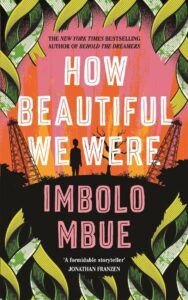
How Beautiful We Were weaves a captivating story of a fictional African village called Kosawa. The people were thriving and living until an American company “discovered” oil on their lands. They swooped in to drill with government backing and no regard for the harm done to the people of Kosawa and their children. People soon begin to die from air and water toxicity as their lands become polluted and infertile. They are exploited as the different promises made to them are not fulfilled.
“I know nothing about how a girl makes men pay for their crimes, but I have the rest of my life to figure it out.“
How Beautiful We Were shows the issues of environmental racism and how indigenous people are not taken seriously regarding land. We find poverty, corruption, greed and irresponsibility on the pages of the book. Postcolonial effects on Africa also are explored.
The book is written in the narrative voices of different people in Kosawa village: The Children served as a collective voice of the children of Kosawa, Bongo, Sahel, Yaya, Juba and Thula, whom the story seemed to revolve around at some point.
The storytelling of Imbolo Mbue is one to tug at your heart’s strings. It is evocative, engaging and will have you on edge for the people of Kosawa. I love that readers get to experience the culture and dreams of the people of Kosawa.
Should You Read?
This book is a slow-burn and a challenging read, but the storytelling and multi-narration make up for that. Imbolo takes us through years of hardship faced by the people of Kosawa from generation to generation. It is a mind-opener and a thought-provoking book. It will leave you questioning many things and hopefully will give you answers.
As hope is a dangerous feeling that leaves you tethering and doesn’t mind your fall, so is this book.

